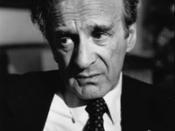In the concluding paragraph of Erick Foner's "The Story of American Freedom" he says that "Americans have sometimes believed they enjoy the greatest freedom of all - freedom from history" (Foner, 332). However, that belief is predicated upon a lie, for the simple reason that it is impossible to look to the future without honoring the past. Americans enjoy many freedoms, but freedom from history is not one of them. In order to succeed in our preservation of freedom, we must heed to the wisdom of our four fathers and our history and not fall victim to indifference. No man is more aware of the constraints of indifference on freedom than Elie Wiesel. Wiesel represents a living and breathing piece of history; his survival and account of the atrocities of the Holocaust stand as a living testament to the necessity of the preservation of the past as a vital facet of freedom.
His speech, "The Perils of Indifference" helped remind America and the World that we have no future without our past and we must forever combat evil in all of its manifestations in order to make possible the freedoms that we enjoy.
On April 12th, 1999 Elie Wiesel spoke to the world on "The Perils of Indifference: Lessons learned from a Violent Century". The event was one of a series of "Millennium Evenings" at the White House, which served as a forum on the topic. The purpose of the "Millennium Evenings" is best explained by Hilary Clinton in her introductory remarks. She says that the event was "designed to mark this specific turning point in history by honoring the past and imagining the future" (White House Transcript, 2). It marked the 54th anniversary of Wiesel's freedom from the Nazi death camps, as well as, the death...


